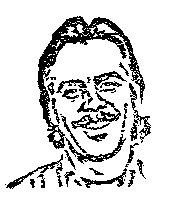
Interviewed and written by: Jodi Heard
As manga continues to grow in popularity, finding in-depth and realiable information on the subject may be quite challening. Frederik Schodt, author of the famous manga information books Manga! Manga! The World of Japanese Comics and Dreamland Japan has provided English-speaking fans with valuable information concerning manga, Japanese culture, and langauge. Akadot had the opportunity to conduct an exclusive interview with Schodt and find out more about his titles and opinions about the popular manga industry. Akadot: What was your first manga experience? Frederik Schodt: If you define manga as "Japanese comics," I suppose I first saw them when I was attending an international high school in Japan. I couldn't speak or read Japanese then. Manga wasn't as popular as it is today, but I must have seen some in noodle shops; the funny thing is that I don't remember them. My first true "experience" with manga was in a university in Tokyo. I was living in a dormitory and my Japanese roommates were all studying manga instead of textbooks. This was around 1970, and manga had taken root among university students in a big way. It was an exciting time. I remember thinking how huge the manga magazines were. I started reading them and became hooked. Akadot: What made you want to write Dreamland Japan? Was there a sense of need for such a book? FS: Dreamland Japan is the sequel of sorts to my 1983 book, Manga! Manga! The World of Japanese Comics (Kodansha International). By the mid-nineties Manga! Manga! had been around a dozen years, and many people were asking about an update. Rather than simply update Manga! Manga! it made more sense to write a new book. By the mid-nineties, moreover, manga had caught on to some extent in the United States, but all the manga being imported and translated seemed to be of a very specific type. I wanted to show that there was much more variety to manga than most people thought. As a result, I deliberately focused on many lesser-known works. Akadot: As a culture, does America grasp the "tone" of manga in the same way as the Japanese do? For example, "where X title is considered a show about loyalty and bravery, X title in America comes off as stubbornness and succeeding in spite of it." FS: There are clearly many manga that Americans would not "get." But there is a filter mechanism at work, in the sense that the manga that are imported and translated are manga that are assumed to be marketable here. Conversely, manga for which there is assumed to be no market for in North America are rarely imported. On the other hand, I have been consistently surprised at the way young American fans of manga often have no problem with material, which is very "Japanese". An example is Rumiko Takahashi's Ranma 1/2. I was very surprised to see how successful it was in the U.S. I think there is a kind of "mind-meld" going on between the East and West, and the mentality of Japanese and Americans is gradually converging. It's inevitable, in a way, since Americans and Japanese live in an extremely similar world today, with the same sets of pleasures and problems. |

